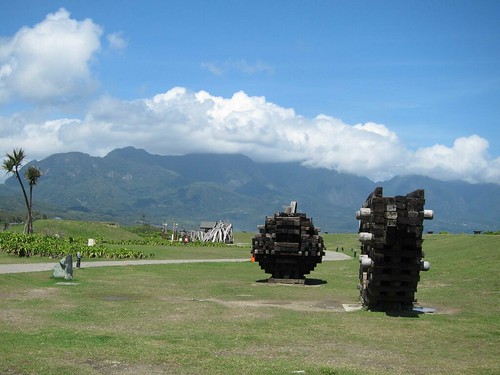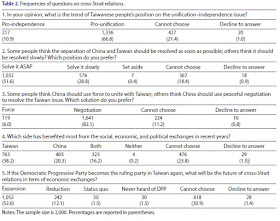AbstractThese findings show that Chinese are massively out of touch behind the Great Firewall. Changing that perception may well be viewed as a national security matter. Even worse, it suggests that as China develops more, support for war in the Taiwan Strait will grow....
While many studies have investigated Taiwanese people’s attitudes towards cross-Strait relations, few studies explore how Chinese people on the other side of the Taiwan Strait perceive the Taiwan issue. Using data collected via a telephone survey that covers 2,000 respondents from ten major cities in China in 2013, this article presents empirical evidence to fill this gap. It finds that most Chinese citizens’ attitudes are aligned with the government’s propaganda on cross-Strait relations. In particular, Chinese citizens have inaccurate perceptions of Taiwanese support for reunification with China. This article also finds that when Chinese respondents think that the city in which they live is more economically advanced than Taipei, the capital of Taiwan, they would support: (1) a faster pace towards a resolution, and (2) the use of military force to resolve cross-Strait confrontations. These findings offer new perspectives on studies of cross-Strait relations and Chinese nationalism.
The first finding perhaps can be explained away by the fact that it is a telephone survey and the people simply parrot whatever the government says. The linkage between city development and support for annexing Taiwan by force, however, is less easy to explain that way.
ADDITION:
Data on specific questions.
Not quite as bad as the abstract makes out. The authors take pains to point out that rising nationalism may not lead to a military solution because it has very little support (see 3). To wit:
Again, Figure 2 demonstrates that respondents who think that their cities have a higher level of economic development than Taipei are more likely to support a fast pace, and even the use of military force, to resolve the Taiwan issue. If respondents think that the city in which they live is more economically developed than Taipei to an extreme (i.e. Gap = 10), the probability for them to support a fast resolution and the use of force to resolve the Taiwan issue would be around 0.83 and 0.18, respectively. Importantly, Figure 2 suggests that the perceived economic superiority of China to Taiwan among Chinese citizens has much more effect on their support for resolving the cross-Strait confrontation than their support for using force against Taiwan. Thus, using force against Taiwan is not an imperative strategy among the majority of Chinese citizens, even if they think China is more economically advanced than Taiwan._______________________
To sum up, this article finds that when Chinese respondents think that the city in which they live is more economically advanced than Taipei City, they support: (1) a faster pace and (2) the use of military force to resolve the cross-Strait impasse.
[Taiwan] Don't miss the comments below! And check out my blog and its sidebars for events, links to previous posts and picture posts, and scores of links to other Taiwan blogs and forums!


How do Chinese respondents square this notion of "67% of Taiwanese people support unification" with Tsai Ing-Wen getting 56% of the vote in the presidential election and the DPP being the majority party in Taiwan today?
ReplyDeleteI could understand Chinese people thinking that back in 2008 after Ma Ying-Jeou captured 58% of the popular vote, but not now.